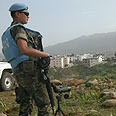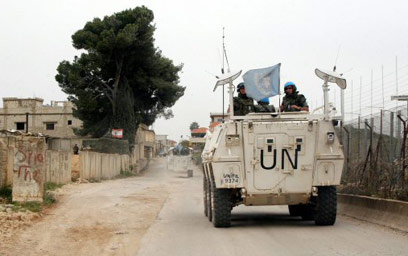
Syria war threatens UN troops on Golan ceasefire line
Raging conflict between Assad, rebels threatens to spread beyond Syria's borders once again; UN forces near Israel-Syria border reinforce weapons' lineup; Lebanon security forces on high alert
United Nations forces based inside Syria to monitor a longtime ceasefire between Syria and Israel will bring in armor to reinforce their security because of a threat posed by an influx of Syrian rebels, the UN peacekeeping chief said.
The UN force deployed in the area after the 1973 Middle East war, between Syria and Israel.
Related stories:
- Rebels warn Israel against Syria interference
- Will terrorists follow rebels to border?
- 5 UNIFIL men hurt in Lebanon blast
Speaking in Paris, peacekeeping chief Herve Ladsous said a number of countries contributing to the UN Disengagement Observer Force (UNDOF) had voiced concerns after two Austrian soldiers were shot on November 29 in an area of Damascus where government troops and rebels have been fighting.
"Certain countries are concerned," Ladsous told reporters on Wednesday. "We will reinforce security, most notably with armored vehicles and we plan to send more political advisers to analyze the situation on the ground."
Ladsous said that while there was no plan to reduce the force, the situation in the area had "abruptly" changed dynamics surrounding the 36-year mission as the rebellion against President Bashar Assad turns ever bloodier.

UNIFIL troops patrolling the border (Archives: Reuters)
"The situation in Syria sparked a cascade of insecurity which has had consequences highlighted by the presence of armed groups belonging to the Syrian opposition in the disengagement zones… There are people being trained that appear a lot like (hardline Muslim) Salafists," he said.
Syrian war spills into Lebanon
Stray shells and bullets from the internal Syrian conflict have landed on the Israeli side of the Golan ceasefire line in recent weeks and Israeli troops fired artillery shells into Syria in response.
Ladsous said that UNDOF, which numbers 1,050 soldiers from Austria, the Philippines, India, Japan, Croatia and Canada, had no specific mandate to deal with the escalating violence.
About 800 of the peacekeepers patrol on the Syrian side of the 1973 ceasefire line.
Their mandate is to oversee a dagger-shaped 400 square km "area of separation" where Syrian military forces are not allowed, but where Syrian security, police, customs officers and hunters may carry firearms.
Meanwhile, gunmen loyal to opposite sides in neighboring Syria's civil war battled on Wednesday in the streets of a northern Lebanese city where two days of fighting killed at least five people and wounded 45, officials said.
The Lebanese army fanned out in the city of Tripoli to calm the fighting, with soldiers patrolling the streets in armored personnel carriers and manning checkpoints.
Authorities closed major roads because of sniper fire.
Lebanese security officials said at least five people have been killed and 45 wounded in the Tripoli fighting since Tuesday. The officials spoke on condition of anonymity because they are not authorized to talk to the media.
The fighting in Tripoli pits the Sunni neighborhood of Bab Tabbaneh, which supports Syria's rebels, against the adjacent Alawite neighborhood of Jabal Mohsen, which supports Assad.
Syrian rebels are predominantly Sunni whereas Assad and his inner circle are dominated by Alawites, an offshoot of Shiite Islam.
Syria's uprising began with peaceful protests in March 2011 and later escalated into a civil war that the opposition says has killed more than 40,000 people.
AP and Reuters contributed to this report
- Receive Ynetnews updates directly to your desktop










